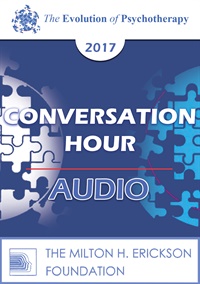EP17 Conversation Hour 06 - Cloe Madanes, LIC, HDL
- Average Rating:
- Not yet rated
- Topic Areas:
- Conversation Hours | Strategic Therapy | Psychotherapy | Therapist Development | Children and Adolescent Therapy
- Categories:
- Evolution of Psychotherapy | Evolution of Psychotherapy 2017 | Pioneers in Couples and Family Therapy
- Faculty:
- Cloe Madanes, HDL, LIC
- Course Levels:
- Master Degree or Higher in Health-Related Field
- Duration:
- 1:01:58
- Format:
- Audio Only
- Original Program Date:
- Dec 15, 2017
- License:
- Never Expires.
Description
Description: Cloe Madanes presents a 15-step method for treating juvenile sex offenders, achieving a 98% success rate through family therapy and spiritual integration. She shares practical tools for addressing parent-child conflict, couples communication, and infidelity, including “Take Three Issues” and “Executive Meetings.” Emphasizing continuity of care, Madanes advocates for one therapist per family and highlights the growing impact of social media on family dynamics.
Syllabus Description: To advance clinical goals, use client-based strategies. Most psychotherapy and coaching can be advanced through strategic applications.
Educational Objectives:
- Describe how to plan a strategy.
- Explain why and how to give a directive.
*Sessions may be edited for content and to preserve confidentiality*
Credits
Handouts
| Timestamped Transcript (784.2 KB) | 18 Pages | Available after Purchase |
| Ericksonian Learning Snapshot (279.2 KB) | 3 Pages | Available after Purchase |
Faculty

Cloe Madanes, HDL, LIC Related Seminars and Products
Cloé Madanes, HDL, LIC, is a world-renowned innovator and teacher of family and strategic therapy and one of the originators of the strategic approach to family therapy. She has authored seven books that are classics in the field: Strategic Family Therapy; Behind the One-Way Mirror; Sex, Love and Violence; The Violence of Men; The Secret Meaning of Money; The Therapist as Humanist, Social Activist and Systemic Thinker; and Relationship Breakthrough. She has presented her work at professional conferences all over the world and has given keynote addresses for The Evolution of Psychotherapy Conference, the American Association of Marriage and Family Therapy; the National Association of Social Workers, The Erickson Foundation, the California Psychological Association and many other national and international conferences. Madanes has won several awards for distinguished contribution to psychology and has counseled outstanding individuals from all walks of life.


